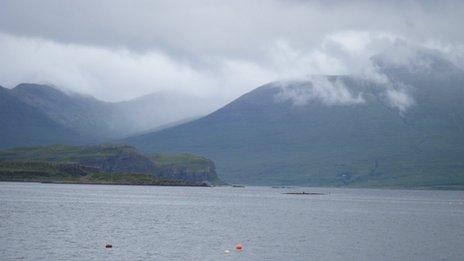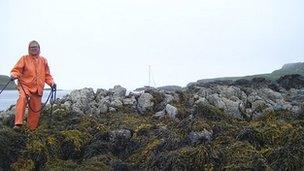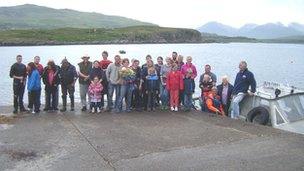How can Scotland cope with China's salmon demands?
- Published

The Scottish salmon industry had a major boost after China opened its doors to imports - but with the government setting a target to increase salmon production by 50% by 2020, local communities are divided over whether the financial rewards outweigh environmental concerns.
"Thousands of people come from all over the world to look at this landscape. This is the one place in the world you shouldn't put a factory fish farm."
Roc Sandford is the owner of the island of Gometra in the Inner Hebrides - one of the wildest and undeveloped parts of the UK.
To get there you have to travel to Mull, summon the small foot ferry to the island of Ulva and then either commission a boat, walk a five mile causeway or, I suppose, swim. There are no roads so a quad bike is the fastest way to get across the island - and the handful of residents live without electricity.
Off the north shore of the island, in Loch Tuath, an application has been made for a fish farm by The Scottish Salmon Company.
"It's a wild landscape and to have something just popping out of the sea with the sheer size that it is, is just not we want here" says resident Rhoda Munro.
The residents have started a petition which they say has been signed by people from over 40 countries and the Community Councils of both Mull and Iona have objected strongly to the farm.
They argue that it will be a navigational hazard, forcing their boats to detour into rougher waters and they are concerned about the impact on wildlife including seals as well as light pollution ruining their rare dark skies.
The Scottish Salmon Company, has declined to comment on the application. But on the neighbouring island of Ulva there is support as the farm will provide four full time jobs.
"The important thing for me is we get some more young families into this area because otherwise it dies out," says Lucy McKenzie who runs a B&B on Ulva.
"If we've no young families, the school closes and if that happens young people move away.
Emma McKie and Rebecca Munro run the Boathouse café on Ulva. They say the tourists who come into the café tell them they are not put off by the nearby fish farms but realise it is part of the life and economy.
"People appreciate that the people who live here have to make a living and you can't survive on the tourist industry six months a year."
"And they are fairly sympathetic to the landscape - they blend in fairly well."
Gometra is just one of the rumbling conflicts across Scotland. In the last six months there have been five applications for new fish farms in Scotland.
The Scottish government's National Marine Plan aims to expand salmon production sustainably by 4% a year from 154,000 tonnes in 2010 to 210,000 tonnes by 2020.

Roc Sandford says thousands of people come from all over the world to look at the "iconic" landscape.
But in January 2011 the Scottish and Chinese governments signed a deal to allow the export of Scottish salmon into the Asian giant's market for the first time. Previously Norway was the main exporter to China
Chinese Vice premier Li said even if only 1% of the people of China chose to eat Scottish salmon it would have to double production but that has rung alarm bells. Demand is also increasing from other Asian countries as well.
Salmon farms have traditionally involved large numbers of fish contained in nets in inshore waters raising a number of environmental issues.
Critics are concerned about the levels of sea lice at farms which can be passed on to passing wild fish and are particularly harmful to juvenile fish. They say escaped fish pass on genetic weakness to wild salmon if interbreeding occurs.
The Salmon and Trout Association's Guy Linley-Adams says they are not against salmon farming but object to "the inappropriate location of some fish farms where they have negative effect on wild fish populations."
There is also concern with the amount of allowed pollution of the sea bed under farms by faeces and waste food and the shooting of predator seals.
But the Scottish Salmon Producers Organisation says the Scottish Environment Protection Agency assesses farms before and during operation, and sets limits on the use of chemicals and allowed pollution.
It says farms are required to monitor sea lice and seals are discouraged by acoustic deterrents and nets. And action is being taken to reduce the number of fish escapes.
"We measure the ecological load an area can take and we offer licences only where were convinced there is a proper balance between effects of fish farming and the ability of local environment to absorb the effects of farming," says Stewart Stevenson the Scottish Minister for Environment and Climate Change. "I think we've been successful in that and that's widely recognised."
Increasingly one way forward is being seen as locating salmon farms outside of lochs in the sea.
Applications are being seen for more dispersive 'open sea' sites out of lochs along the shoreline, which it is hoped could prove less of a threat to wild fish as they are away from the river mouths.

With many young men relying on the fishing industry for work - many in Ulva support the fish farms
"On the West coast where we've traditionally farmed, it's difficult to find suitable locations to give you a good size of farm," says Steve Bracken from one of the largest salmon producers, Marine Harvest which already has two open sea sites in Uist and Barra and three more potential sites.
"2,500 tonnes is the maximum amount of live fish you can hold on your farm at any one time. So by going further out into open water locations we hope we might see larger farms develop out there."
Another possible development is "closed containment" systems where fish are grown in large tanks kept within the sea or on land and water is pumped in, filtered and recirculated.
The Salmon and Trout Association says this system would eradicate all their concerns.
Three possible onshore sites in Scotland have been identified by Andrew Robertson for his company Fish From. These are more expensive to set up but he does not think shoppers would be put off by this tank style system rather than having had them swimming in the sea.
"The quality of the product has to come highest in the list of people's beliefs," he argues, and points out there is a need for new production systems for the increasing world population.
"In the next 18 years the UN has identified there will be a huge shortfall in aquaculture produced food and unless it grows by 60million tonnes there is going to be a shortfall in nutrition. In 2050 when there are 9bn people on the planet there isn't going to be a way of feeding them without innovative ways of growing high quality nutrition."
Applications for inshore fish farms are still being made and the level of pollution that is deemed acceptable is still disputed. But for Tessa McGregor a biologist who lives on Ulva the dilemma is not just represented in Scotland but around the world.
"It's a balance with 7bn people... so this is a tiny microcosm of the tough decisions we're going to have to make worldwide. The world has changed, farming has changed, our carbon footprint, our expectations have changed and we've got to look at what is now sustainable globally."
Costing the Earth: Chinese Salmon is broadcast on BBC Radio 4 Tuesday, 11 September at 15:30 and repeated Wednesday, 12 at 21:00.
- Published13 March 2012
- Published16 October 2011
- Published8 June 2011
- Published12 January 2011